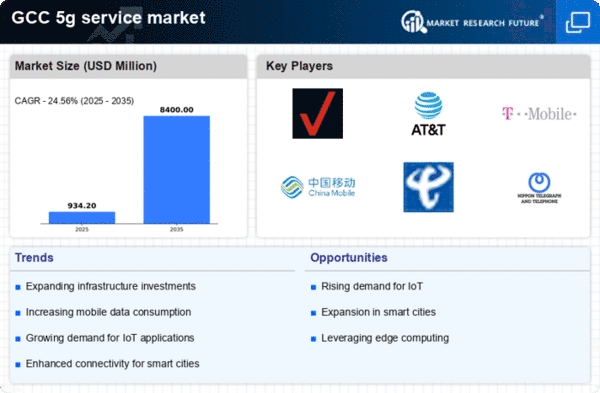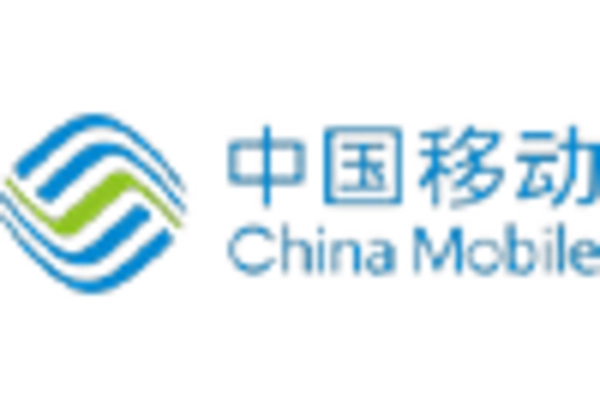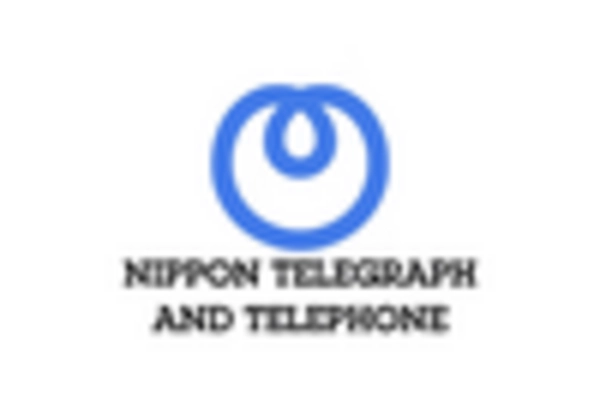Government Initiatives and Regulations
Government initiatives in the GCC region are playing a pivotal role in shaping the 5g service market. Regulatory bodies are actively promoting the deployment of 5g infrastructure through favorable policies and incentives. For instance, the introduction of streamlined licensing processes and reduced spectrum fees has encouraged telecom operators to invest in 5g technology. As a result, the market is projected to grow at a compound annual growth rate (CAGR) of approximately 30% from 2025 to 2030. Furthermore, government-led initiatives aimed at enhancing digital transformation across various sectors, including healthcare and education, are expected to drive demand for 5g services. This regulatory support not only fosters competition among service providers but also ensures that the 5g service market remains robust and innovative in the GCC.
Rising Demand for High-Speed Connectivity
The increasing demand for high-speed connectivity is a significant driver of the 5g service market in the GCC. As businesses and consumers alike seek faster and more reliable internet services, the need for advanced mobile networks becomes apparent. The proliferation of data-intensive applications, such as video streaming and online gaming, has led to a surge in data consumption. Reports indicate that mobile data traffic in the region is expected to reach 10 exabytes per month by 2026, highlighting the urgency for enhanced network capabilities. Consequently, telecom operators are investing heavily in 5g infrastructure to meet this demand. This trend not only supports the growth of the 5g service market but also positions the GCC as a competitive player in the global telecommunications landscape.
Increased Investment in Smart City Projects
The GCC region is witnessing a surge in investment in smart city projects, which is a key driver for the 5g service market. Governments are prioritizing the development of smart infrastructure to enhance urban living and improve public services. These projects often rely on advanced connectivity solutions, making 5g technology essential for their success. For instance, initiatives aimed at integrating IoT devices for traffic management, waste management, and public safety require robust and high-speed networks. The total investment in smart city initiatives in the GCC is projected to reach $100 billion by 2030, creating a substantial demand for 5g services. This trend not only supports the growth of the 5g service market but also aligns with the region's vision for sustainable urban development.
Growing Mobile Gaming and Entertainment Sector
The mobile gaming and entertainment sector is rapidly expanding in the GCC, serving as a significant driver for the 5g service market. With the increasing popularity of mobile games and streaming services, consumers are demanding faster and more reliable internet connections. The mobile gaming market in the GCC is expected to reach $1.5 billion by 2026, reflecting a growing appetite for high-quality gaming experiences. 5g technology, with its low latency and high data speeds, is well-positioned to meet these demands. As telecom operators enhance their 5g offerings, the entertainment sector is likely to flourish, further propelling the growth of the 5g service market. This synergy between gaming and telecommunications underscores the potential for innovation and economic growth in the region.
Technological Advancements in Telecommunications
Technological advancements in telecommunications are significantly influencing the 5g service market in the GCC. Innovations such as network slicing, edge computing, and massive MIMO (Multiple Input Multiple Output) are enhancing the efficiency and performance of 5g networks. These technologies enable operators to provide tailored services to various industries, including automotive, healthcare, and smart cities. The integration of artificial intelligence (AI) and machine learning (ML) into network management is also streamlining operations and improving service delivery. As a result, the 5g service market is expected to witness substantial growth, with investments in telecommunications technology projected to exceed $20 billion by 2027. This technological evolution not only enhances user experience but also drives the adoption of 5g services across diverse sectors in the GCC.
















